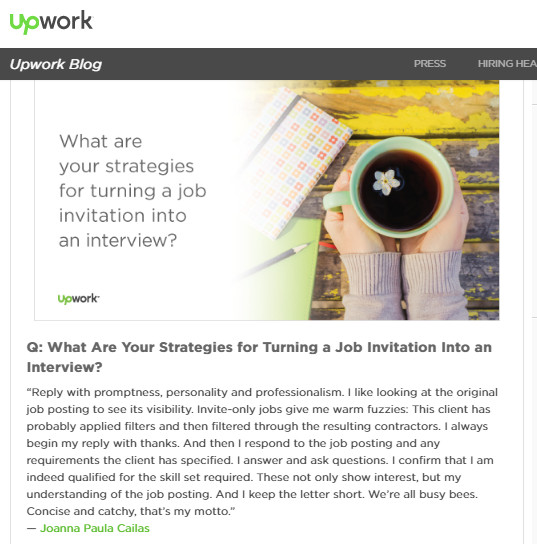Future of Work
20 Tips on How to Become a Successful Freelancer
Published
5 years agoon

Digital nomads, remote working, solopreneurs: all alternate names for success in the digital space — and digital is inextricably linked to freelancing. Why? Because all you need is a laptop and an internet connection and you’re away.
Freelancing gave rise to the gig economy, a key disrupter of mature industries and businesses. Grab and Uber are, after all, freelance drivers. Airbnb hosts are freelance hoteliers. Their house, their rules, their style. Task Rabbit, Air Tasker — freelance driven. And who can forget Upwork – the #1 independent worker and freelance platform globally.
Competition is now spread out worldwide among freelancers. Employers are fighting on a new battleground for top talent. They’re not just competing with other companies for employees. They’re competing with individuals working from home, or wherever they feel the most productive.
So what can you do to become a successful freelancer?

1. You need grit
You do need skills in the digital space. You can learn that. You can take courses from Coursera, EdX, Udemy, Hubspot, Skillshare, free or paid, and there are so many guides online on how to do your thing right, and earn money from it.
But grit — you need to be above average when it comes to grit.
Grit is passion and mental toughness and perseverance.
- Grit will drive you to learn what you don’t know yet
- Grit makes you open and adaptive to methods or tasks you haven’t done before
- Grit will preserve your sanity and self-respect when you deal with difficult clients and teammates
- Grit makes you fight for what you’re worth
In the first place, grit is what makes you go for freelancing, to do what you love to do. And freelancing isn’t easy. Grit makes you keep going and keep getting better at what you do.
I’ve seen talented people who stagnate because they don’t have grit. Or they can’t freelance at all because they need to be told what to do; they need to be employed, to be handed the work that needs doing, because they can’t really spot it otherwise, they’re not proactive and they don’t see opportunities in the best and sometimes hidden spots.
Want to measure or develop your grit? You can read Malcolm Gladwell, James Clear and Angela Duckworth, among others, and watch various TED Talks that address self-confidence, commitment, passion, and the difference between success and failure.
2. Get employed first
Here’s What I Would Do If I had To Start Over and Rebuild My Business (It’s NOT What You Think)
There are many ways you can go about becoming an entrepreneur.
But if I had to start over, I would do almost everything differently.
Here’s what I would do to if I had to start over today.
Posted by Neil Patel on Thursday, July 25, 2019
I wrote for magazines and national newspapers before I became a freelance writer. This isn’t strictly “employment” since only one magazine had me in the masthead, but it still worked for me threefold: it honed my taste, it developed my skills, and it showed me what worked and what didn’t, not just in pitches, but in the technical aspects of content. I saw what my editor changed and kept.
I needed those when I started freelancing. And I continue to learn from each of my employers, but I certainly didn’t start with zero. No one can start at zero, not in today’s freelancing market, and not if you want the “freedom” part of freelancing.
Do you like what you do? You discover this when you’re an employee. For instance, going to work despite bad weather, bad commute, and bad people for the sake of the work you like doing. Because you need to like it!
Do you know enough about your trade? Are you even in the right niche? Can you compete with agencies with all their industry knowledge?
Your success as a freelancer rests on the foundation of what you bring to the table right from the beginning. Getting employed helps you learn so much, not just about your chosen niche, but about yourself.
3. Never burn bridges
Following the above, transitioning to freelancing is ideally a step from a standardized professional life to a freer professional life. You usually resign. In less lucky circumstances, you might get laid off. Either way, leave without making enemies.
In fact, make it so that you can always go back to your execs and team leaders for a glowing reference or testimonial!
If you’re already a freelancer, every task is a future testimonial.
4. Pick your clients carefully
Every task is a testimonial, but only if your client is a good enough person to appreciate you and say something good about what you’ve done.
Many, many freelancers I know waste their time with horrible clients and end up with bad feedback or a bad back from all the stress.
The telltale signs:
- They lowball you. They won’t pay your rate, rationalizing it with, “I have a lot of work for you” or, “once you show me proven results I’ll increase the hours”, Sound familiar?
- Communication is poor. They think you’re a mind reader. They give poor instructions and they don’t listen to you, but will be quick to blame when there is a misunderstanding.
- Their ego is the size of Texas. Each of us has a level of tolerance for lack of manners, but some clients have a certain arrogance that – if you’re not careful – can make you hate what you do. Step away. Far away. Remember not to burn bridges, but don’t be a doormat either.
- You’re their slave. What did you become a freelancer for? Flexibility, right? Freedom to spend your time as you wish. But some people operate under the assumption that freelancers’ flexibility are for accommodating client demands, 24 hours a day, weekends and whenever they need to contact you. Nope. You won’t succeed if a client chokes you.
5. Strike a balance
When you start, look at the entry level rates of your peers, and then set your rate from your skills and experience.. You might have expert level skills, but if you can’t back that up yet with feedback history and a portfolio, post an intermediate rate.
As you collect more experience and feedback, increase your rate in proportion with your job history.
Not burning bridges and maintaining good relationships with your clients helps a lot in improving your freelancer rate. If you say you’re going to do something, do it. Don’t waste your clients time. It’s the quickest way to lose their trust.
6. Learn to negotiate

When you get started, you have no history, no feedback, no reviews — and that’s why need to set your price at its most competitive. You look outward, at other freelancers and their rates.
When you start to establish yourself a little, look inward, at your own job history and how you feel and think about it. Freelancing is always a balance of feeling and logic. That’s what makes you happy.
Feeling: What pay level were you most happy about?
Logic: How much time and effort did each type of task take?
The pay level you’re most happy about pays your bills and gives you extras, so it’s logic too, really. 😀 Set it up now so that you can quote similar jobs on this job and be happy about your quote.
BUT, you should still be willing to negotiate:
Feeling: Do you like the client and her company? Is it work you love?
Logic: What other perks do you get? Is it a startup with not a lot of money to spare? Is the work not too demanding?
Make it official
Post your rate, put it in writing your contract templates, and make sure it’s visible in your profile/website. In platforms like Upwork, your rate is already there, and the client inviting you to a job or you yourself sending a job proposal has the rate in writing.
Be confident
If you’ve done your research and you feel sure the client can afford your rate, stand firm. Don’t settle and give in. It sets a bad precedent for more work with that client, or with other clients. As I said, you want every job to be a guideline on your rate for future jobs.
7. Hone your focus and productivity

We all do this differently. Some people need to sit at a desk to get into work mode. Shared workspaces abound in many cities frequented by digital nomads especially for this.
When you work at home, it can take some work to establish er, work. You may need to “train” your family to not disturb you, to respect a closed door and not make noise. I’m deaf, so I simply close my door and work. My work hours luckily coincide with my pets’ sleeping hours, too.
My biggest distractions are social media and researching other stuff that come to mind like 20s flapper fashion or the Duke and Duchess of Windsor. I have to discipline myself to work in my work hours. I also use a tool, FocusBooster, to give me a pomodoro cycle of big chunks of focus and small break times in between.
Whatever works for you, even if that means you need to get dressed, you do need a desk, and you do need a door: anything to fence yourself in to signal to your brain and to others that you’re working.
8. Stay on top of the best tools
I’m a writer, and you might think all we use is Google Docs or MS Word. Nope. If I did only use those, I’d soon stop getting work. I also work with Trello, Klaviyo, WordPress, Canva, Hootsuite… and I certainly use Grammarly! It’s handy!
And I’m still learning about new tools and platforms. Digital is constantly evolving, and you want to use the best and the latest. Your clients would thank you if you also brought them forward instead of stunting their growth or staying with them in anything outdated.
You can also easily outpace established freelancers this way: we’re all laidback and chill but it’s still a race and the one who uses the best tools can win. Keep learning.
9. Say no as much as you say yes
I explored Klaviyo so I can directly compose and send out a client’s emails. But I say no to analytics. I can also use Canva, but I say no to creating blog graphics– that can go to the graphic designers who can do it way faster and better.
Saying no means you open those hours to better opportunities instead!
10. Learn to communicate
Freelancing revolves around pitches, cover letters, and open communication.
Pitches and cover letters
Depending on your niche, you may need to craft proposals, so writing really does set you apart from your competitors.
If you need to, sign up for free courses on writing. But it’s simple really: truly respond to the job post. Don’t talk about yourself. Talk about what the client needs and how your skills make you the best person for the job. Even proposals are the same way– just a longer, more detailed cover letter of what the client requires and what you plan to do about it!
And show a bit of personality. Make your potential client like you and prefer you over other candidates. A sense of humor goes a long way, but don’t force it. Be empathic and respond to how the client talked. If they were casual, use the same tone. If they were a little more formal, you can bet they expect a little formality in your application, too.

Open communication
Your client can’t see you at your desk working. She relies on your word to show her you’re getting work done! Open communication is your way of being there even if you’re not with your client.
-
- If your client emails you, reply as soon as you can, and address everything in the email.
- If you’re working on a big project, send progress reports every day or every week.
- Get things done and then tell your client what you did that day.
- If you receive important information or additional instructions on the task you’re working on, confirm receipt of the info and the instruction. Echo what they said, or tell them how you understood the task, so they can confirm or correct you if needed.
- Sometimes clients would rather not receive daily reports or updates. Set things up so you and your client can understand each other without emails or IMs, something as simple as labels on Gmail or Teamwork are enough. Moving cards across and color coding on Trello also work.
Honesty and transparency
Are you getting piled with more work than you expected? Do you need help? Or maybe you need an extension on a tight deadline? Is there an SOP that you’re not happy with because it’s antiquated and/or inefficient?
Speak up. Some freelancers give freelancers a bad name for being closed off and apathetic. They log in, do the work, and they log off. I understand how we can end up doing that without meaning to because we’re busy. But being part of the company doesn’t take too much time and effort. All it takes is honesty and transparency.
This establishes a real camaraderie between you and your client, which means more work and a very nice testimonial!
11. Manage expectations
This expands on communication and transparency but it’s so important it needs its own section! Understand what your client needs and wants done, and you should both be clear and in agreement on the work you’ll do and everything in the process.
An understanding is a two-way street: communicate your own needs and expectations. You might have your own timelines, your own methods, and your experience gives you a broader perspective about the project than your client, so you should anticipate and communicate any issues before they happen.
For example, in my case, I always give myself a big margin for submissions. If I think I can submit it on Monday, I tell my client Friday, and I tell him that it’s a margin in case I’m waylaid by something I didn’t account for.

It can also be the number of free edits I’m willing to do, in case of an ebook ghostwriting gig. I tell the client I’ll submit a draft and I’ll need feedback on style and tone as soon as possible so that the submission wouldn’t have huge structural edits at all. If the client wants chapter by chapter submissions but it’s not possible because I need to go back and forth and might change things, I say so.
In graphic design and web design, this is important, because big edits can be time-consuming and delay going live. And social media management isn’t always perfect, no matter how far ahead you are– sometimes the platforms you use, like Hootsuite, goes offline and disrupts your schedule.
These don’t have to be problems if you talk about them before they become problems.
Anticipate and communicate: tell your client right from the start about everything so you can manage their expectations and deliver within it.
12. Never multi-task
Even the best clients can have a rush of tasks demanding your time and focus. Or you might be so successful that you have tasks from several clients lined up.
You should line them up, that’s the trick. Don’t spread them out on your desk, figuratively.
Focus on one task at a time, never compromising on quality. Prioritize according to urgency. Even if one client gave you the task first, you don’t need to work on it if another task has the closer deadline!
It shows in your work when you gave it less than 100% focus. And multi-tasking is also an expressway to burnout.
13. Avoid burnout
You can love what you do and still end up hating it if you’re not careful. All of the above tips will save you from burnout: for example, if you carefully choose good clients and you mindfully line up work to avoid overwhelm, you’ll be fine.
Most people say, take a vacation and go offline. It’s good advice, but you can do that daily. It’s all about harmony between your work and life. You’re a freelancer, so don’t grind as if you have a fire-breathing boss staring at you.
Take naps. Schedule breaks. Don’t take work you hate and definitely do stuff that give you joy, whether that’s a paint by numbers hobby, eating beef lasagna, or binge-watching on Netflix.
14. Invest in your health

You want to protect your source of income: that’s you! When you’re sick, you don’t work, and you don’t earn.
Avoid burnout and take supplements that give you a boost both mentally and physically. Get a health card for preventive checkups, and definitely invest in health insurance so you won’t have to take a chunk out of your hard-earned money if you, say, break your arm in an accident! This is required especially if you travel while freelancing.
At the very least, make sure you’re covered in your local security system and national health insurance. In the Philippines, it’s SSS and Philhealth voluntary membership. These work for your dependents, too.
If a treadmill or an elliptical at home will get you your much-needed exercise, get one. Buy good shoes so you can run in the mornings or keep up with FitnessBlender without discomfort in your feet. You’ll be dying trying to catch your breath but your feet will be fine.
15. Know the best way to get paid
We have so many options and it’s a matter of offering them to your clients, or clients picking what works with them.
Payoneer, Transferwise and PayPal. Bank transfers. Bank fees from remittances. Platform commissions and withdrawal fees. All these factors help you decide:
-
-
- Which service/s to use
- How often to withdraw your money into your bank account so you can save on fees
- How much to invoice your clients so you offset those fees
-
16. Always have a contract
This is where using a platform like Upwork is ideal. The contract is neatly tied up with payment protection and escrow.
When you freelance from your own website, you avoid platform fees, but the downside is you need to setup your own protection: contracts and upfront fees.
Don’t wait until you have a job underway before getting your paperwork in order. You can get template contractor agreements online and personalize it. Or set up packages with upfront fees and the remainder when the job is completed– and the output is released only upon payment completion.
For hourly work, you can use Teamwork, Time Doctor, and Hubstaff for billing, among others. But you need that contract.
17. Explore and expand
What niche is closely connected to yours? For example, web development and graphic design– it’s a complete package for a website revamp. If you’re a graphic designer, you could learn to code, or perhaps specialize in specific platforms like WordPress and Shopify.
Honing your craft with at least one more skill supercharges your value. A writer who can also set things up in Facebook advertising, for instance. That’s killer! In my case, I used to do articles and ebooks only. I expanded to social media and emails. This gave me so much more work. After all, not all businesses need blogs, but all businesses need to send out emails.
What’s a killer combo for your skills?
Exploring and expanding also means networking. Other freelancers in the same niche may have task overflow and you can help them out. Or other freelancers in other niches may have clients looking for your skills.
18. Be social

Speaking of networking, expand socially and be seen. Share your knowledge. Help others out. What you give, you get in return. To start networking, you need to be in a network. A Facebook group is a good start. Join a community and participate. You also get to pick other freelancers’ brains. You get tips, techniques, tools.
You also learn about relevant networking events, where you can get even more tips, techniques, tools, and freebies and some exclusive news ahead of its release to the public.
19. Expand your funds
You need to be prepared for dry spells. Freelancing means you might earn $$$$$ in one week and then not have any income for 2 weeks. Ideally, you keep your income flow steady, but you always need money to fall back on.
Tip #2 talks about getting employed first: this also works in getting you started on your freelancing fund. Not to mention an emergency fund, a travel fund, and so on, not to be confused with the funds-you-don’t-touch. I mean, you don’t get to touch that money at all because it goes directly to your bills. 😀
The first few years of freelancing, save, save, save. Build a fund and don’t touch it yet until spending a chunk is only a tiny chunk against the rest of it!
Save and invest so you can get your money to work for you, too.
20. Brand yourself
You’re a solopreneur. Your freelancing is your little business. You might even hire an assistant to help you! But don’t wait until “you get big.” Don’t think you’re not qualified yet because you’re still just you, no assistant.
You’ve arrived. And once you’ve established yourself in a freelancing platform, you should have enough in your portfolio and job history to build a very nice website about your services. This is when you can truly be free, attracting clients on your own website!
-
- Name your business. Even if it’s just your name + your niche. Minimalist!
- Get a logo done. It can be as simple as picking a font. Make it official and use what you picked in everything, especially your email signature and social media cover images.
- Set up a social media page and populate it with helpful posts.
- Prepare for your website portfolio by offering discounts for bylines, credits, or your logo in your work.
- Ask your clients for testimonials. The best homepages are chock full of people saying nice things about you








